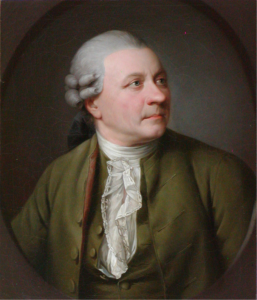Edone
(Poet's title: Edone)
Set by Schubert:
D 445
[June 1816]
Part of The Theresa Grob Album
Dein süßes Bild, Edone,
Schwebt stets vor meinem Blick,
Allein ihn trüben Zähren,
Dass du es selbst nicht bist.
Ich seh es, wenn der Abend
Mir dämmert, wenn der Mond
Mir glänzt, seh ich’s, und weine,
Dass du es selbst nicht bist.
Bei jenes Tales Blumen,
Die ich ihr lesen will,
Bei jenen Myrtenzweigen,
Die ich ihr flechten will,
Beschwör ich dich, Erscheinung,
Auf, und verwandle dich,
Verwandle dich, Erscheinung,
Und werd Edone selbst!
Your sweet image, Edone,
Is forever hovering before my eyes;
Yet my vision is clouded by tears
Because it is the image, not you yourself.
I see it when evening
Plunges me into twilight, when the moon
Shines on me, I see it and weep
Because it is the image, not you yourself.
By all of the flowers of the valley
That I would like to pick for her,
By those sprigs of myrtle
That I would like to plait together for her,
I conjure you, oh apparition,
Up and transform yourself!
Transform yourself, apparition,
And turn into Edone herself!
All translations into English that appear on this website, unless otherwise stated, are by Malcolm Wren. You are free to use them on condition that you acknowledge Malcolm Wren as the translator and schubertsong.uk as the source. Unless otherwise stated, the comments and essays that appear after the texts and translations are by Malcolm Wren and are © Copyright.
☙
Themes and images in this text:
Evening and the setting sun Flowers Metamorphosis Myrtle Night and the moon Pictures and paintings Sweetness Tears and crying Valleys
Klopstock probably intended the name Edone to be a form of the Greek Aëdon (ἀηδών, songstress), a mother who had been metamorphosed into a nightingale after killing her own child in a tragic case of mistaken identity. Penelope (Odysseus’s wife) refers to her song of lament in The Odyssey:
". . . when night comes and sleep lays hold of all, I lie upon my bed, and sharp cares, crowding close about my throbbing heart, disquiet me, as I mourn. Even as when the daughter of Pandareus, the nightingale of the greenwood, sings sweetly, when spring is newly come, as she sits perched amid the thick leafage of the trees, and with many trilling notes pours forth her rich voice in wailing for her child, dear Itylus, whom she had one day slain with the sword unwittingly, Itylus, the son of king Zethus; even so my heart sways to and fro in doubt . . ." Homer, Odyssey 19: 515 - 524 English translation by A. T. Murray, Harvard University Press (1919)
The speaker in Klopstock’s poem associates the beloved Edone with the idea of metamorphosis throughout the text. He realises that his own thoughts about her are constructing an image which can only fall short of what she is in reality. He attempts to conjure her to appear as herself, not as an apparition or fantasy. It is noticeable that she has no voice of her own, though. As we listen to the beautiful sounds of the nightingale’s song, we attribute pathos and lamenting to it. We create myths to say that the bird is ‘really’ a grieving mother who can never recover from accidentally killing her own son and, in consequence, we hear sadness and pain in the song. We then stop listening to the bird as a bird with its own concerns and motivations. We have to wonder if Klopstock’s speaker is fully open to experiencing Edone as she is in ‘herself’.
☙
Original Spelling Edone Dein süßes Bild, Edone, Schwebt stets vor meinem Blick; Allein ihn trüben Zähren, Daß du es selbst nicht bist. Ich seh' es, wenn der Abend Mir dämmert, wenn der Mond Mir glänzt, seh' ich's, und weine, Daß du es selbst nicht bist. Bey jenes Thales Blumen, Die ich ihr lesen will, Bey jenen Myrtenzweigen, Die ich ihr flechten will, Beschwör ich dich, Erscheinung, Auf, und verwandle dich! Verwandle dich, Erscheinung, Und werd' Edone selbst!
Confirmed by Peter Rastl with Klopstocks Oden. Erster Band. Leipzig bey Georg Joachim Göschen. 1798, page 311.
To see an early edition of the text, go to page 311 [329 von 356] here: http://digital.onb.ac.at/OnbViewer/viewer.faces?doc=ABO_%2BZ223304809


